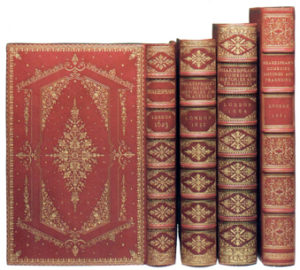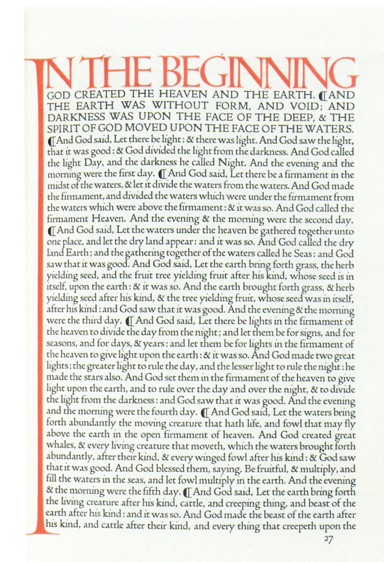SELECTIONS FROM HAVEN O’MORE
AUCTIONS IN 1989 AND 2019
THE COLLECTION OF THE GARDEN LTD.
 When the hammer dropped for the last time at the November 1989 auction of The Collection of The Garden Ltd.: Magnificent Books and Manuscripts, a stunned murmur ran through the room. Not since the days of Dibdin and the sale of the Roxburghe Library had a book auction seen such aggressive competition and bidding.
When the hammer dropped for the last time at the November 1989 auction of The Collection of The Garden Ltd.: Magnificent Books and Manuscripts, a stunned murmur ran through the room. Not since the days of Dibdin and the sale of the Roxburghe Library had a book auction seen such aggressive competition and bidding.
The Garden Ltd. Collection was conceived and created by Haven O’More as a gift and legacy for the human future. Viewing book collecting as a purposeful work of art and service, O’More sought to create a singular library composed of “Master Mind Works” that paid homage both to great Ideas and to the Beauty of the printed book. The Garden Ltd. Collection was conceived on a grand and conscious scale, and O’More actively pursued “the finest examples of mankind’s greatest books.” The 1989 auction catalogue reads like a book collector’s dream want list fulfilled – the 1st edition of Don Quixote, the finest copy of Copernicus in private hands, a perfect matching set of the Shakespeare Four Folios, John Locke’s autograph manuscript of Essay Concerning Human Understanding, etc. – testifying both to the intensity of O’More’s Vision and to the efficacy of his collecting. A revolutionary mode of collecting at its time, The Garden’s high-spot emphasis has been copied ever since by major collectors.
ON THE MYSTERY OF THE BOOK
Contemplation of three words – magnae mentis opera or “great or supreme works of the mind” – perhaps more than anything, became the underlying principle controlling the inception and guiding the formation of The Collection.
Great or supreme works of the mind are the spiritual heart pumping a life-giving blood through the veins of mankind, a higher blood before any physical blood, a spiritual blood providing purpose and continuity and meaning. The supreme works are the sine qua non works of human existence and possibility – literally, “without which not.” Such works must be viewed, at a certain level, from a negative point of view. This is because sine qua non, expressing the negative at the highest level of logic transforms to the most affirmative. The highest cannot be more praised than from the negative.
In this life, any truly thinking man or woman despairs for meaning: and contemplating the supreme works of the mind at once provides the balm of real meaning to a generally meaningless world. Nothing is withheld.
Supreme works of the mind stand in the future, contrary to historical appearances. From the future, where the greatest power lies, the consummate reality of supreme works molds the present and gives new shape to the past.
The first mistake in reading and contemplating a supreme work is to attempt to place it in a certain illusory horizon of the past and try to leave it there. The greatest works will not accept the judgement of false history. Nothing great and supreme is bound by time, certainly not past time.
And the present, as Plato says, “is unreal because as we utter the word, it is past.”
As to the past, it is unreal because it has no stability except in memory which, on the empirical level, is commonly a distortion. From the transcendental point of view or the view most embodied in the supreme works of the mind, Memory is clarity and certainty of vision deriving its power from the ever-stable future.
Without necessarily saying as much, the supreme works show this to the contemplating mind. Advancing into the future, the contemplating mind becomes identical with that mind making the works. Making is the correct word here, for the works unfold or are made as the contemplating mind makes itself in the process of re-creating and even deepening the work it contemplates.
Contemplation, deep and long, is the most creative activity open to the human mind. In contemplation, the human mind transcends itself: soon it is no longer the human mind but mind qua mind. Aristotle puts it this way in his exquisite summing up in the Metaphysics of the essence of mind employing its highest activity – “nous nousing nous” or, more conventionally, “mind contemplating mind.”
In the activities that follow from the activity of mind qua mind lies the only sure way for continued human existence.
No real future lies in so-called economic or political solutions, as the past reveals. Such “solutions,” not being grounded in higher possibilities, always quickly reverse to their opposites.
Mind looking into mind itself provides not solution but transformation.
In such activity as well as non-activity lies true possibility: it parallels and conforms to the unfolding of the universe in all its manifestations.
To continue for the longest time rather than the shortest, man must rise to his full contemplative energies.
Proof?
The supreme works of the mind, magnae mentis opera, point to nothing else.
Test?
Read, contemplate, and see.

